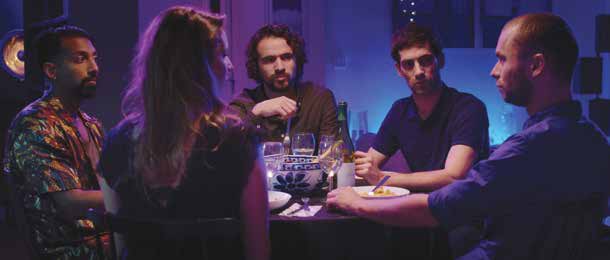
By Gary M. Kramer–
Don’t Look Down,available February 15 on VOD,is a stylish and stagey film by writers/directors Olivier Ducastel and Jacques Martineau about four men and one woman who meet in a high-rise apartment where a man they all once loved (separately) is being held in a locked room. He is never seen. As these strangers talk (and talk and talk), they recount their experiences with the man. Each individual also privately visits with their ex off screen, getting a chance to settle a score.
The filmmakers take a canny approach to showing who the guy was by how he influenced each lover. As such, Don’t Look Down has some shrewd observations about the nature of relationships, abusive and otherwise. Ducastel and Martineau chatted with me for the San Francisco Bay Times about their fabulous new film.
Gary M. Kramer: How did you conceive of the story and this concept of gathering strangers together connected by their ex?
Jacques Martineau: It was your idea at first … [indicating Olivier].
Olivier Ducastel: I had this idea that a character with this combination of narcissism and perversity would be interesting, but I didn’t have a concept for a story. I talked with Jacques and he was considering different ideas, and that different characters in this room would interact, but that they don’t know each other. We would have each character explore each other and confront their experience with the bad guy.
Jacques Martineau: We are not interested in the bad guy; we are more interested in victims. So, it was a movie about the victims with the “pervert” on the edge.
Gary M. Kramer: What points did you want to make about relationships and the various permutations on how couples interact and behave?
Jacques Martineau: What was funny in writing and directing is that we did not totally agree about the abuser. I deeply think that the person you love is always an abuser because love is dangerous. When you are entering a relationship where you suffer, you have to find a way to make the relationship not toxic. That’s my idea. Some people are very bad, and I know abusers exist. It’s tricky to speak about a relationship, a love relationship, and the different forms it takes. Each character represents one way to engage in a relationship. Sadistic, masochistic, etc. You have to put the characters together and think about what it means to be in love.
Olivier Ducastel: We also thought about the position of the viewer. There are five characters in the apartment, but there are six, because each person in the audience is around the table and in the apartment for the night. We made a decision during editing to leave space for people watching the film.

Gary M. Kramer: We have to guess how these strangers all found each other and believe that they are all telling the truth. And that the ex is unable to leave the room he is locked in. What assumptions do you want viewers to make regarding the film’s setup?
Olivier Ducastel: The actors had questions when we began reading the script. They needed answers for everything. We tried to avoid answering questions and preferred that they ask themselves the questions and find answers for each other and not share the answers—e.g., how the evening was organized. It would be more interesting during the shooting and acting of the scenes if there was curiosity about the characters and the scenario.
Gary M. Kramer: What can you say about the visual approach to the story? It is set in one room, but you use light and color and space to convey different emotions, moods, and feelings.
Olivier Ducastel: The visual approach continues the work we did in Paris 05:59: Théo and Hugo, with color and framing, and the space between actors. It was a discussion between us and the cinematographer, Manuel Marmier, who was concerned that Don’t Look Down would be visually boring. He suggested we change the ambiance for every scene. There were enough lights to change it at every time lapse. That’s why the guy who lives in the apartment had nice lamps and colors.

Gary M. Kramer: I appreciate that we do not see the man/ex in question, nor do we understand what transpires as each stranger enters the room he is in and confronts him. What do you want people to imagine happens in those off-screen scenes?
Jacques Martineau: We wanted it to be abstract.
Olivier Ducastel: We tried during the process to leave freedom for every viewer to have their own decision or point of view on that matter.
Gary M. Kramer: There is a real sexual tension that develops between some of the strangers. How did you work on creating the bonds between the characters as the story progressed?
Jacques Martineau: During the rehearsals, we tried to invent something sensual. We had sexual tension with the guy who is connecting them. That was the rule: no sexual contact between the characters.
Olivier Ducastel: At one point during shooting, we said it would be the first film we made without a kiss.
Jacques Martineau: We wanted to do something totally different because everyone was expecting a sexual thing.
Olivier Ducastel: It’s also to give space for imagination about what is going on in the room and what their relationship was with this guy. We wanted the attraction and tension to be felt throughout the film. We wanted the opposite—are we able to create sexual tension only with words?
Jacques Martineau: And bodies.
Olivier Ducastel: No contact or explicit sex.
Jacques Martineau: We had stories between the guys, a subtext that two of them probably had a sexual relationship in the past.
© 2022 Gary M. Kramer
Gary M. Kramer is the author of “Independent Queer Cinema: Reviews and Interviews,” and the co-editor of “Directory of World Cinema: Argentina.” Follow him on Twitter @garymkramer
Published on February 10, 2022
Recent Comments